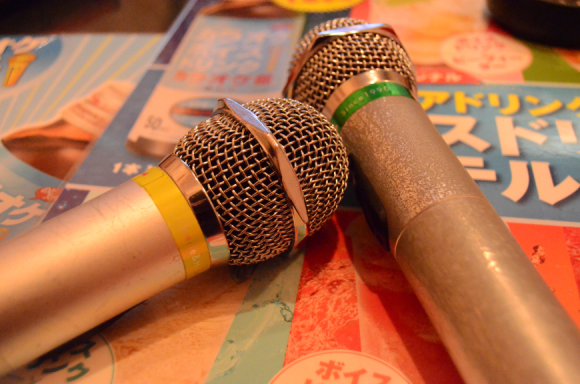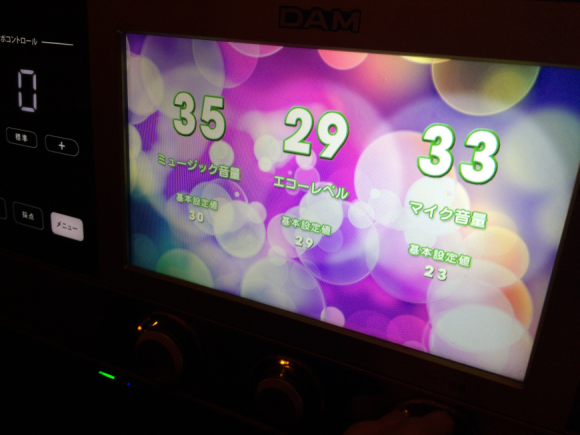
Drop your books and grab the mic, because it’s time for a lesson in how to up your karaoke game.
At some point during your time in Japan, you’re likely to find yourself in a karaoke box. Maybe you’re checking off one item box on your Japan experience vacation checklist, or maybe you’ve moved here and your new coworkers or classmates feel the best way to bond is by belting out some pop songs together.
Either way, at some point you’re probably going to have a microphone in your hand and, if you’re a karaoke novice, butterflies in your stomach. So to help you feel a little more confident when the lyrics appear on-screen and it’s time to sing, we turned to singer-songwriter Yu Mamada.
Mamada is right in the middle of a solo tour, but she took the time to stop by our office and give us the following three pointers for how to step up from singing in the privacy of your shower to singing in front of other people at karaoke.
1. More so than pitch, focus on the song’s rhythm
“There’s something people who are good at karaoke have in common,” Mamada explained, “and that’s that they’ve got the rhythm of the song down. Sure, pitch is important, but it’s really the people who’ve got the rhythm who make the song sound good at karaoke, so pay attention to that point when thinking about how to sing.”
2. Adjust the echo and volume for your song
Each karaoke room has its own karaoke machine inside, and you can adjust various echo and volume levels by twisting knobs on the unit itself or using its remote control. The three big ones to check for are microphone volume (マイク音量 in Japanese text), music volume (ミュージック音量), and echo (エコー).
Just like a professional would fiddle with these levels before each song in a recording session or concert set list, so too does Mamada recommend setting them to match the mood of the song you’ve chosen to sing.
3. Sing songs you like
The whole point of karaoke is to have fun, so it’s always important to sing songs that you, personally, like. Not only will you have a better time, your appreciation for the song’s sound and lyrics will shine through in your performance, making it more enjoyable for the rest of the group as well.
The other upside to singing songs you like? You’ll sing them more often, which is good because karaoke, like any other skill-based activity, is something you become better at with practice.
“Taking a song that someone else wrote and making it your own takes time,” Mamada told us. “For me, it sometimes takes six to 12 months before I can really nail it.”
With our lesson complete, we asked for a demonstration, and so it was off to our local karaoke parlor with Mamada, where the musician gave us a private concert in which she sang her own hit, “Idol.”
And while we don’t think we can sing it as well as she did, armed with our three new karaoke tips, we don’t think we’ll sound half-bad the next time we’re out singing with friends either.
Want to see/hear more of Yu Mamada? She’ll be appearing live at Tokyo’s Shinjuku Gyoen Rosso on May 27. Tickets are available here.
Follow Casey on Twitter, and maybe he’ll provide backup vocals when you go to karaoke together (even if he doesn’t know the song you’re singing).
Related: Yu Mamada website, Twitter, Facebook
Images ©RocketNews24
[ Read in Japanese ]




 How can you maximize the calories you burn singing karaoke?【Experiment】
How can you maximize the calories you burn singing karaoke?【Experiment】 How to improve your singing at karaoke with a deceivingly simple trick
How to improve your singing at karaoke with a deceivingly simple trick A private onsen bath with a karaoke machine is two of Japan’s best things with zero embarrassment
A private onsen bath with a karaoke machine is two of Japan’s best things with zero embarrassment Japanese karaoke chain offers discounts for couples who kiss in front of the employees
Japanese karaoke chain offers discounts for couples who kiss in front of the employees Here’s what Japanese netizens think of the U.S.’s top 20 most-picked karaoke songs
Here’s what Japanese netizens think of the U.S.’s top 20 most-picked karaoke songs Red light district sushi restaurant in Tokyo shows us just how wrong we were about it
Red light district sushi restaurant in Tokyo shows us just how wrong we were about it Historical figures get manga makeovers from artists of Spy x Family, My Hero Academia and more
Historical figures get manga makeovers from artists of Spy x Family, My Hero Academia and more Japan’s massive matcha parfait weighs 6 kilos, contains hidden surprises for anyone who eats it
Japan’s massive matcha parfait weighs 6 kilos, contains hidden surprises for anyone who eats it Haku is…Chihiro’s dead brother? Studio Ghibli fans blown away by Spirited Away theory
Haku is…Chihiro’s dead brother? Studio Ghibli fans blown away by Spirited Away theory Sandwiches fit for a sumo served up in Osaka【Taste Test】
Sandwiches fit for a sumo served up in Osaka【Taste Test】 Beautiful Red and Blue Star luxury trains set to be Japan’s new Hokkaido travel stars
Beautiful Red and Blue Star luxury trains set to be Japan’s new Hokkaido travel stars Pokémon Sleep camping suite and guestrooms coming to Tokyo Hyatt along with giant Snorlax burgers
Pokémon Sleep camping suite and guestrooms coming to Tokyo Hyatt along with giant Snorlax burgers Japan’s cooling body wipe sheets want to help you beat the heat, but which work and which don’t?
Japan’s cooling body wipe sheets want to help you beat the heat, but which work and which don’t? Tokyo Tsukiji fish market site to be redeveloped with 50,000-seat stadium, hotel, shopping center
Tokyo Tsukiji fish market site to be redeveloped with 50,000-seat stadium, hotel, shopping center Starbucks Japan adds a Motto Frappuccino to the menu for a limited time
Starbucks Japan adds a Motto Frappuccino to the menu for a limited time McDonald’s new Happy Meals offer up cute and practical Sanrio lifestyle goods
McDonald’s new Happy Meals offer up cute and practical Sanrio lifestyle goods All-you-can-drink Starbucks and amazing views part of Tokyo’s new 170 meter-high sky lounge
All-you-can-drink Starbucks and amazing views part of Tokyo’s new 170 meter-high sky lounge More foreign tourists than ever before in history visited Japan last month
More foreign tourists than ever before in history visited Japan last month Japanese ramen restaurants under pressure from new yen banknotes
Japanese ramen restaurants under pressure from new yen banknotes French Fries Bread in Tokyo’s Shibuya becomes a hit on social media
French Fries Bread in Tokyo’s Shibuya becomes a hit on social media Studio Ghibli releases new action figures featuring Nausicaä of the Valley of the Wind characters
Studio Ghibli releases new action figures featuring Nausicaä of the Valley of the Wind characters New private rooms on Tokaido Shinkansen change the way we travel from Tokyo to Kyoto
New private rooms on Tokaido Shinkansen change the way we travel from Tokyo to Kyoto Starbucks reopens at Shibuya Scramble Crossing with new look and design concept
Starbucks reopens at Shibuya Scramble Crossing with new look and design concept Studio Ghibli glasses cases let anime characters keep an eye on your spectacles
Studio Ghibli glasses cases let anime characters keep an eye on your spectacles Beautiful Ghibli sealing wax kits let you create accessories and elegant letter decorations【Pics】
Beautiful Ghibli sealing wax kits let you create accessories and elegant letter decorations【Pics】 Studio Ghibli releases Kiki’s Delivery Service chocolate cake pouches in Japan
Studio Ghibli releases Kiki’s Delivery Service chocolate cake pouches in Japan New definition of “Japanese whiskey” goes into effect to prevent fakes from fooling overseas buyers
New definition of “Japanese whiskey” goes into effect to prevent fakes from fooling overseas buyers Our Japanese reporter visits Costco in the U.S., finds super American and very Japanese things
Our Japanese reporter visits Costco in the U.S., finds super American and very Japanese things Studio Ghibli unveils Mother’s Day gift set that captures the love in My Neighbour Totoro
Studio Ghibli unveils Mother’s Day gift set that captures the love in My Neighbour Totoro New Japanese KitKat flavour stars Sanrio characters, including Hello Kitty
New Japanese KitKat flavour stars Sanrio characters, including Hello Kitty New Pokémon cakes let you eat your way through Pikachu and all the Eevee evolutions
New Pokémon cakes let you eat your way through Pikachu and all the Eevee evolutions Disney princesses get official manga makeovers for Manga Princess Cafe opening in Tokyo
Disney princesses get official manga makeovers for Manga Princess Cafe opening in Tokyo Sales of Japan’s most convenient train ticket/shopping payment cards suspended indefinitely
Sales of Japan’s most convenient train ticket/shopping payment cards suspended indefinitely Sold-out Studio Ghibli desktop humidifiers are back so Totoro can help you through the dry season
Sold-out Studio Ghibli desktop humidifiers are back so Totoro can help you through the dry season Japanese government to make first change to romanization spelling rules since the 1950s
Japanese government to make first change to romanization spelling rules since the 1950s Ghibli founders Toshio Suzuki and Hayao Miyazaki contribute to Japanese whisky Totoro label design
Ghibli founders Toshio Suzuki and Hayao Miyazaki contribute to Japanese whisky Totoro label design Doraemon found buried at sea as scene from 1993 anime becomes real life【Photos】
Doraemon found buried at sea as scene from 1993 anime becomes real life【Photos】 Tokyo’s most famous Starbucks is closed
Tokyo’s most famous Starbucks is closed One Piece characters’ nationalities revealed, but fans have mixed opinions
One Piece characters’ nationalities revealed, but fans have mixed opinions We asked a Uniqlo employee what four things we should buy and their suggestions didn’t disappoint
We asked a Uniqlo employee what four things we should buy and their suggestions didn’t disappoint Princesses, fruits, and blacksmiths: Study reveals the 30 most unusual family names in Japan
Princesses, fruits, and blacksmiths: Study reveals the 30 most unusual family names in Japan Never get bored on a long flight again with Jetstar and Joysound’s Karaoke Flights!
Never get bored on a long flight again with Jetstar and Joysound’s Karaoke Flights! Enjoy karaoke while high! High up in a Ferris wheel that is
Enjoy karaoke while high! High up in a Ferris wheel that is The Top 10 anime theme songs that Japanese people jammed to at karaoke in 2021
The Top 10 anime theme songs that Japanese people jammed to at karaoke in 2021 Over 500 karaoke boxes close due to Covid-19, dealing historic blow to the industry
Over 500 karaoke boxes close due to Covid-19, dealing historic blow to the industry Take your singing to new heights on the world’s first karaoke Ferris wheel in Tokyo
Take your singing to new heights on the world’s first karaoke Ferris wheel in Tokyo I need gum, milk, and a verse of “Let It Go”: Special karaoke convenience store to open
I need gum, milk, and a verse of “Let It Go”: Special karaoke convenience store to open Love costumes and karaoke? Shinjuku Cosplay Karaoke is just what you need! 【Pics & video】
Love costumes and karaoke? Shinjuku Cosplay Karaoke is just what you need! 【Pics & video】 Luxury hotel chain offering karaoke in a large tub floating on the ocean
Luxury hotel chain offering karaoke in a large tub floating on the ocean The time P.K. flatly refused a request from his deceased best friend’s mom at their first meeting
The time P.K. flatly refused a request from his deceased best friend’s mom at their first meeting Cultural differences spoiling the sing-along version of Frozen for some fans
Cultural differences spoiling the sing-along version of Frozen for some fans Nintendo sends unto us Toad to utterly butcher a Christmas carol this holiday season 【Video】
Nintendo sends unto us Toad to utterly butcher a Christmas carol this holiday season 【Video】 A singalong song from Japan to surpass “Paprika?” Presenting “Karaoke Neko-chan”【Video】
A singalong song from Japan to surpass “Paprika?” Presenting “Karaoke Neko-chan”【Video】 Skip Starbucks? A super-cheap, semi-secret alternative to a coffeehouse break in Tokyo
Skip Starbucks? A super-cheap, semi-secret alternative to a coffeehouse break in Tokyo Beer, Suntory whiskey for under a buck and all-you-can eat ice cream! Joy at Tokyo’s Karaoke One
Beer, Suntory whiskey for under a buck and all-you-can eat ice cream! Joy at Tokyo’s Karaoke One Subpar AKB48 performance in Thailand earns scalding remarks from netizens 【Video】
Subpar AKB48 performance in Thailand earns scalding remarks from netizens 【Video】
Leave a Reply